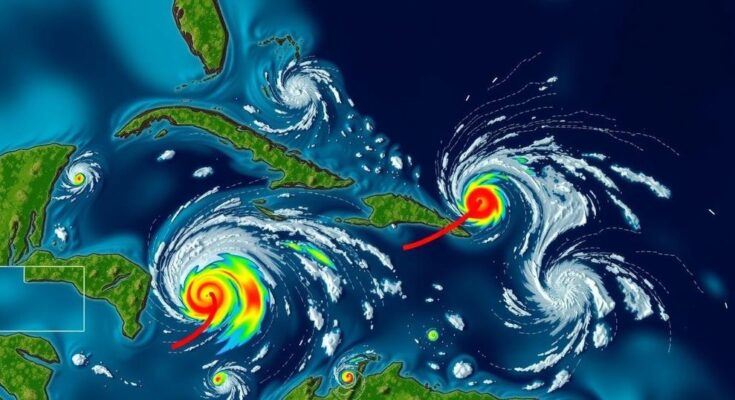The 2024 Atlantic hurricane season ended with 18 named storms, including 11 hurricanes and five majors. It aligned with NOAA predictions and saw significant events like Hurricane Beryl, the earliest Category-5 hurricane. Technological advancements in forecasting and data collection played a critical role in managing this active season, despite a brief lull due to adverse weather conditions in Africa.
The 2024 Atlantic hurricane season has concluded with a total of 18 named storms, including 11 hurricanes and five major hurricanes, according to the National Oceanic and Atmospheric Administration (NOAA). This season, although it exhibited instances of unprecedented activity, remained within the predicted ranges established by NOAA’s Climate Prediction Center. Notably, five hurricanes made landfall in the continental United States, with two classified as major hurricanes.
The season was characterized by a significant amount of scientific interest coupled with operational challenges. Matthew Rosencrans, lead hurricane forecaster at NOAA, remarked that the season began intensely before experiencing a lull due to adverse weather conditions in Western Africa. Interestingly, Hurricane Beryl achieved the distinction of being the earliest recorded Atlantic basin Category-5 hurricane, whereas Hurricane Helene was unique in that it was forecasted as a major hurricane prior to developing into a tropical depression.
Rick Spinrad, NOAA Administrator, underscored the importance of scientific forecasting in light of the destructive capacity of hurricanes, advocating for the necessity of NOAA’s services for communities and emergency planners. Additionally, Hurricane Milton showcased rapid intensification, with wind speeds escalating by 90 miles per hour within a single day, leading to widespread flooding and the generation of 46 tornadoes in Florida.
Dr. Michael Brennan, Director of NOAA’s National Hurricane Center, praised the technological advancements achieved during the season, noting that preliminary data indicated unprecedented accuracy in track forecasts. The Hurricane Hunter aircraft were instrumental during the season, completing 392 mission hours and deploying over 1,246 scientific instruments to gather invaluable data related to storm behavior.
The Atlantic hurricane season runs from June 1 to November 30, during which tropical storms and hurricanes typically form in the Atlantic Ocean. NOAA’s Climate Prediction Center provides forecasts regarding the expected number of storms and hurricanes each season, helping to prepare communities for potential impacts. The records of storm activities, including their intensity and landfall statistics, are vital for understanding their implications and improving future predictions. It is critical for authorities to monitor and analyze these seasons in order to enhance public safety and develop better response strategies.
In summary, the 2024 Atlantic hurricane season concluded with 18 named storms, reinforcing predictions made prior to the season. Despite periods of intense activity and notable events such as Hurricane Beryl and Milton, the overall storm count was consistent with NOAA’s expectations. The advancements in forecasting technology and the operational efforts of hurricane response teams played a crucial role in managing the impacts of these storms, highlighting the ongoing need for scientific expertise in mitigating the effects of such natural disasters.
Original Source: caribbean.loopnews.com




